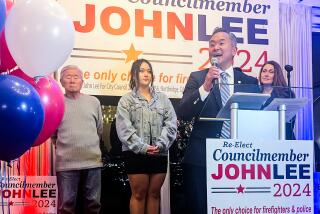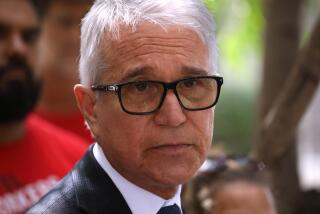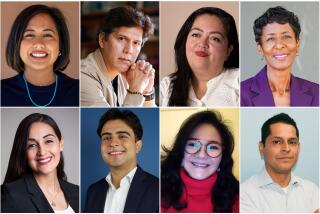Scads of Debates, but Scant Interest
- Share via
Invariably, Mayor James K. Hahn intones the name of his police chief within minutes, sometimes seconds, of beginning to speak.
Bob Hertzberg delivers lectures about the fundamentals of good government, leavened with occasional Yiddish. Councilman Antonio Villaraigosa cannot say enough about the city’s need for leadership. Councilman Bernard C. Parks consistently finds new ways to blame Hahn for the city’s ills.
And state Sen. Richard Alarcon (D-Sun Valley) implores his listeners and his opponents to come together. “Folks,” he said recently, “we are all in the same ship.”
Part theater, part lecture series, part divorce court, these are the Los Angeles mayoral debates. Odd, almost anachronistic, they persist in a city where a mayoral election must compete for attention with the trial of the King of Pop.
For the five leading candidates, the debates are a grueling road show that includes stops at synagogues, schools, TV studios and community centers across the vast city. The latest installment airs Monday at 8 p.m. on KCAL-TV Channel 9.
These civic smack-downs may lack a modern-day Abraham Lincoln or Stephen Douglas, yet they offer an unusually close-up view of the men who would lead America’s second-largest city.
In their humorous, nasty and sometimes stultifying moments, the candidates give hints of what kind of mayor each would make, illuminating their visions for the city, their attitudes toward government and leadership, and their odd fixations.
Hertzberg, as one example, comes off as a cheerful prophet of doom, sketching out great suffering and dire crises even as he exhibits limitless faith in his own plans to fix them.
Parks, meanwhile, presents himself as a business-friendly populist, bashing unions while pledging to free City Hall from a little-reported scourge: the tyranny of “the folks who ride the limousines.”
When Lincoln and Douglas squared off in seven debates in the 1858 U.S. Senate race in Illinois, crowds topping 12,000 flocked to fairgrounds and town squares to hear the men discuss the future of slavery and the nation.
Today, a typical Los Angeles mayoral debate rarely attracts more than a few hundred spectators, many of them the beaming family members, frenzied campaign aides and bedraggled reporters who accompany the candidates like a circus tent crew.
None of the debates have yet produced the kind of seminal moment that can define -- or alter -- a campaign.
But the political debate does not appear to be in danger of extinction even in usually apolitical Los Angeles. By the March 8 election, most of the top candidates will have attended about two dozen.
Debates remain a fixture, some political observers said, precisely because the city is such a diffuse collection of neighborhoods that political news does not garner the type of attention it does in cities such as New York and Chicago.
“You don’t have the kind of unifying political organizations in Los Angeles that exist elsewhere,” said Cal State Fullerton political scientist Raphael Sonenshein. “You have labor unions, neighborhood associations, temples, churches.”
Candidates must go to the far reaches of the city of 4 million in search of the 500,000 voters expected to cast ballots. And in an era when parts of the city, including the San Fernando Valley, have tried to secede, there is an even greater premium on reaching out, Sonenshein said.
“What secession did was force L.A. to get smaller.... There is much more of a feeling now that you have to get out of City Hall and say something to the voter in Tujunga,” he said. “It’s ironic. As L.A. gets bigger, it actually gets more like a small town.”
At the Museum of Tolerance on the Westside in December, there was a small-town quality to the campaign’s first debate between the five leading candidates.
Huddled behind a table onstage -- some later complained that they were awkwardly bumping knees -- the five looked more like contenders for class president than seasoned politicians.
It was a discomfiting start for nearly everyone.
Villaraigosa almost missed the event, because he was stuck in traffic. Parks never cracked a smile as he stared off into the void, his hands clasped in a vice grip. Drooping bags under Alarcon’s eyes made some observers wonder if he was ill. Hertzberg required powdering during commercial breaks.
And Hahn, hunching his shoulders, and inhaling and exhaling deeply, appeared to some spectators to want to be somewhere else.
Like many incumbents, the mayor has attended fewer debates than his challengers and plans to go to only a handful more.
If the first debate served as a warmup, however, it also offered a preview of how the candidates would use the forums to campaign for the hearts and minds of Los Angeles voters.
The mayor lasted only six words before he mentioned his police chief, William J. Bratton, under whose watch crime has dropped dramatically.
Villaraigosa, striking an earnest tone, sadly commented twice that the city had become “paralyzed by scandal” under Hahn.
Hertzberg nearly leaped from behind the table as he told viewers he was going “skip the platitudes and cut right to the chase,” which for him meant dismantling the Los Angeles Unified School District.
All of the challengers attacked Hahn.
Over the ensuing weeks, the candidates began to relax as they grew into their roles and honed their campaign shticks.
Like beauty queen contestants who must pretend to like their fellow competitors, the candidates now greet one another with smiles, pats on the back and the occasional embrace.
Hertzberg entered a North Hollywood theater before a debate there last month singing. Parks has begun to smile, if only rarely.
Villaraigosa drops Hebrew words into his remarks.
Hahn’s challengers appear to enjoy playing attack-the-incumbent so much that they have begun setting each other up. When Villaraigosa, Parks and Alarcon were given a chance to question each other at a debate last week, the first thing Villaraigosa asked Parks was why Hahn had failed to expand the police force by 1,000 officers.
“There’s a collegiality that develops as you move forward,” Alarcon said. “It’s the same as boxers who get in the arena and have respect for each other.”
Combining a 1960s idealism with Zen-like equanimity, Alarcon, who is seen as a longshot, has impressed many debate watchers. The former city councilman never seems to tire of praising his competitors and testifying to how cooperation can help foster everything from recycling to airport planning.
“We must learn to regenerate ourselves as we move along,” he said at a debate sponsored by the Los Angeles League of Conservation Voters.
Parks, who failed to win a second term as police chief because of Hahn’s opposition, typically paints a darker picture of the city and the incumbent mayor. He finds fault with Hahn’s attendance as a member of the Metropolitan Transportation Authority board, his support for a three-day workweek for police officers, his environmental record, his endorsements from organized labor and, of course, his fundraising.
At one debate, Parks called the Port of Los Angeles, which Hahn has pledged to clean up, “a cesspool of environmental concern.”
Hertzberg campaign consultant John Shallman said of Parks, “He’s been doing most of the heavy lifting in terms of attacking Hahn.”
But Hertzberg too sees woe in Los Angeles, identifying “extraordinary challenges,” a “public health crisis” in air pollution, a tax structure that is “just killing us.” For the wonky former Assembly speaker, who brought a thick economic study on Los Angeles to the podium at one debate, these are teachable moments. “What you need ... is someone who gets it,” he emphatically told downtown business leaders at that debate.
Villaraigosa just as insistently talks about what it means to be a leader -- in noble, albeit vague, terms.
“We need a leader who can unite us, who can inspire us,” he said Saturday at a debate in South Los Angeles during which he strolled into the audience like a TV talk show host. “I don’t have a magic wand.... But I got energy. I got passion.”
The mayor -- who has endured attack after attack -- usually just brushes aside his opponents’ exalted claims.
“We’ve been hearing this word ‘leadership’ a lot today,” Hahn said in closing remarks at another recent debate. “But a lot of it is the kind of political posturing and hot air that we’ve unfortunately been getting used to over the years.”
The usually unflappable incumbent always seems to find a way to get back to his record, peppering his remarks with references to task forces, housing units and crime statistics.
Hahn’s message is simple: “Let’s keep the momentum going.”
*
Times staff writer Patrick McGreevy contributed to this report.
More to Read
Get the L.A. Times Politics newsletter
Deeply reported insights into legislation, politics and policy from Sacramento, Washington and beyond. In your inbox twice per week.
You may occasionally receive promotional content from the Los Angeles Times.











